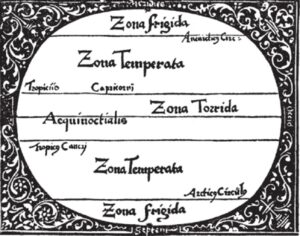La construcción del concepto de clima: zona, klima y meteorología en la Edad Antigua
Llull, 2025, vol. 48, nº 96
The construction of the concept of climate: zone, klima and meteorology in the Ancient Age
David Garcimartín Arenas
Resumen
La importancia actual del concepto de clima ha generado interés en conocer su origen. Se busca entender cuándo y cómo surgió la idea de distribuir las condiciones atmosféricas en regiones geográficas. Los conceptos de zona y klima, propuestos en la ciencia antigua, son antecedentes remotos. Sin embargo, cada uno se desarrolló de manera independiente.
El concepto de zona pertenece al discurso astronómico. Define regiones térmicas según el ángulo de inclinación solar. Por otro lado, el klima se refiere a franjas latitudinales en las representaciones gráficas del mundo habitado. Ninguno de estos conceptos abarca el significado actual de zona climática. Tampoco en el saber antiguo sobre meteoros existe una noción comparable.
En la filosofía natural, especialmente la aristotélica, sus supuestos epistemológicos dificultaban la creación de este concepto. El rechazo a la abstracción matemática y la falta de instrumentos de medida lo impedían. Este artículo estudia el sentido original de zona, klima y meteoros en sus discursos respectivos. El análisis argumenta que la concepción actual del clima solo fue posible tras la transformación científica del siglo XVII.
Así, el estudio contribuye a una comprensión rigurosa de la ciencia antigua. También evita proyecciones conceptuales que distorsionan sus categorías desde una lectura anacrónica de los textos.
Abstract
The current importance of the climate concept has sparked interest in understanding its origins. Researchers seek to discover when and how the idea of distributing atmospheric conditions across geographic regions emerged.Ancient science introduced the concepts of «zone» and «klima» as early precedents, though each developed independently. The term «zone» is rooted in astronomical discourse and defines thermal regions based on the angle of solar inclination. In contrast, «klima» refers to latitudinal bands in graphic representations of the inhabited world.
Neither of these concepts covers the modern meaning of a climate zone. Likewise, ancient meteorological knowledge did not include a comparable notion.Within natural philosophy, especially the Aristotelian tradition, certain epistemological assumptions made it difficult to develop this concept. The rejection of mathematical abstraction and the lack of measuring instruments were significant obstacles.
This article examines the original meanings of «zone,» «klima,» and «meteors» within their respective discourses. Through this analysis, it argues that our current understanding of climate only became possible after the scientific transformation of the seventeenth century.
In doing so, the study contributes to a more rigorous understanding of ancient science. It also helps avoid conceptual projections that distort ancient categories through an anachronistic reading of historical texts.
Palabras clave
Historia del concepto de clima; zonas climáticas clásicas; klima geográfico; meteorología aristotélica
Keywords
History of the concept of climate; classical climate zones; geographical klima; Aristotelian meteorology


